The First National Dialogue on Writing Centres
13 April 2017
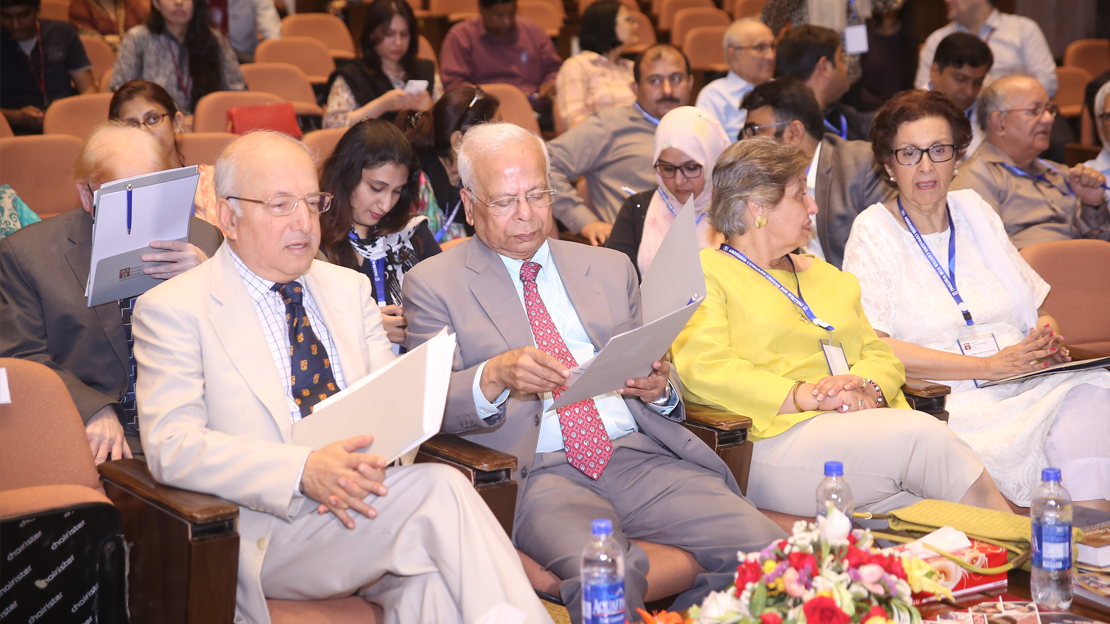
The First National Dialogue on Writing Centres, organized by the Ardeshir Cowasjee Centre for Writing (ACCW) was held at the G&T Auditorium, IBA Karachi. The objective of the symposium was to introduce the concept of a Writing Centre as an academic support at tertiary and higher education levels. The plenary discussions and presentations deliberated on the need for Writing Centres in institutes with an L2 (2nd Language) as a mode of instruction and assessment.
The session commenced with recitation of verses from the Holy Quran, followed by opening remarks by Senator (R.) Javed Jabbar. Thanking the members in the audience, he said, 'I see before me a distinguished range of scholars, faculty and students. Thank you so much for taking the time to come to IBA.' He thanked Dr. Farrukh Iqbal, Dr. Ishrat Husain, the Cowasjee Foundation and its Trustee, Ms. Ava Cowasjee, who enabled the creation of this Centre, Dr. Faiza Mushtaq and Ms. Maria Hassan, for overseeing the ACCW. 'This symposium honors Mr. Cowasjee, who wrote with great courage and commitment, week after week; may he rest in peace', said Mr. Jabbar.
Speaking about writing, Mr. Jabbar stated that it is a great process, which distinguishes human beings from animals and birds. Neither of these species can codify their thoughts and emotions, algorithms, theorems and then decode them, and therefore, this is humanity's greatest invention. He concluded by stating that the pivotal role of writing cannot be ignored.
Ms. Maria Hassan, Director ACCW and Professor Social Sciences & Liberal Arts, IBA, thanked all the participants for attending and began by speaking about the fundamental concept of Writing Centres. 'Writing is an ongoing process and the ACCW assists students in developing their thoughts, whilst also improving their writing skills,' she stated. In Pakistan, students have to deal with multiple languages at the same time, which makes higher education more challenging for them. Therefore, Writing Centres can play a significant role in improving the pedagogical framework for writing courses at universities.
Followed by this, Dr. Ishrat Husain, Prof. Emeritus & Chairman, Centre for Excellence in Islamic Finance IBA, addressed the audience. 'Most of the research and scientific discoveries in the world are taking place in the English language. If we want to be a part of this global change, then we need to be competent in this language.' The Writing Centre offers students a chance to master their writing skills, especially those from the Talent Hunt Programs. He also thanked Ava Cowasjee, the Cowasjee Foundation and Mr. Jabbar for overlooking the Centre.
The next address was delivered by Ms. Ava Cowasjee, daughter of Mr. Ardeshir Cowasjee, who is the inspiration of the ACCW. 'My father believed that the sole way a country could progress was through mass education, especially for women.' She also shared some words of wisdom said by her father, 'Go out in the world of today, and try to change things through writing, and maybe you can change the attitudes of those who fraudulently occupy positions of power in our country. Remember, the aim is to change for the better!'
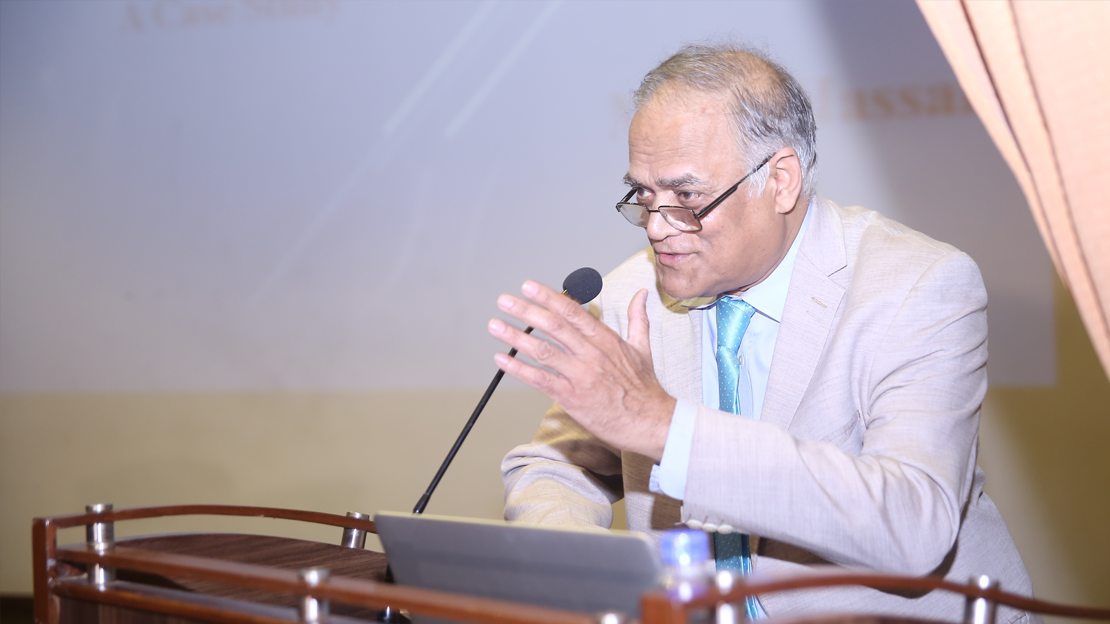
Dr. Tariq Rehman, Dean, Liberal Arts & Social Sciences, Beaconhouse National University, presented the Keynote Address. He spoke about the development of various scripts in the subcontinent such as Arabic, Sanskrit and Urdu. 'Writing also plays a key part in society – it marginalizes the world of oral tradition including the myths upon which it was contingent,' he specified. He concluded by stating that the South Asia is still witnessing a transition from oral to the written stage in the society. One consequence of the privileging of writing in this region is that the oral-based sections of our societies have been marginalized and subjected to neglect. Mr. Javed Jabbar then presented Mementos to Ms. Ava Cowasjee, Dr. Ishrat Husain and Dr. Rehman.
The panelists of the first plenary session were Neelam Hanf, Stephanie Lee, Mohsin Tejani and Neihan Yaqoob, and the moderator was Ms. Maria Hassan. Mr. Tejani, from the Ruqaiya Hassan Writing Centre (RHWC), stated that the RHWC is not affiliated with any institute, is non-commercial and is not monolingual. Ms. Yaqoob, from the Virginia Commonwealth University in Qatar talked about how most people think a writing centre is a corrective facility. This needs to be changed. The third speaker, Ms. Lee, from the Habib University, also said that a key challenge is to lead students to the Writing Centre and build a relationship with them. Ms. Hanif, from the FC College in Lahore, again faced the same problem about misconceptions amongst the faculty and students regarding the purpose of the Writing Centre.
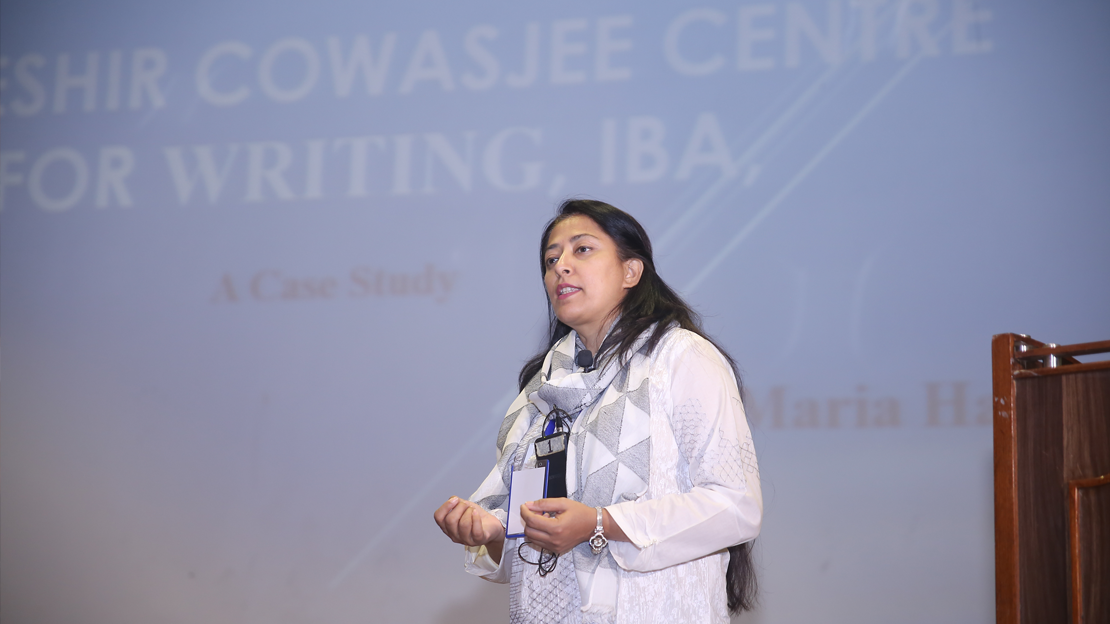
Following this, the Writing Centre Consultants gave short presentations regarding their experience at the ACCW. Wafa Fatima Isphani spoke about how being a writing consultant is more than just being a good writer; a large part of being a consultant is to gauge what the student is looking for. Muneeb Ahmed talked about what makes a good writing centre consultant – a consultant is essentially a facilitator rather an evaluator who should have the ability to brainstorm with students, be open to criticism, gauge students' level and deal accordingly. The third presenter, Daniyal Channa, mentioned how writing is not an act of isolation, but rather an act of introspection.
The panelists for the second plenary session on challenges of writing pedagogy in Pakistan were Dr. Sajida Zaki, Chairperson, Department of Humanities, NED University, Roger Smith, Director, EL Enhancement, Aga Khan University and Dr. Habib Ullah Pathan, Director, ELDC, Mehran University of Engineering & Technology and the moderator was Professor Nasreen Pasha from Kinnaird College. Dr. Zaki said that the greatest challenge is to teach writing in a culture which does not understand writing itself. Speaking about the importance of good teachers, Mr. Roger Smith said that a good teacher has immense power to help students in their writing. Dr. Habib Ullah Pathan spoke about the importance of creative writing, which is not just limited to the curriculum. To this Ms. Pasha elaborated that it is not just the job of the English teacher to improve a student's writing, but rather all teachers need to emphasize the importance of writing correctly. The floor was then opened for questions, after which Mr. Jabbar presented shields to the panelists of the first and second plenary sessions.
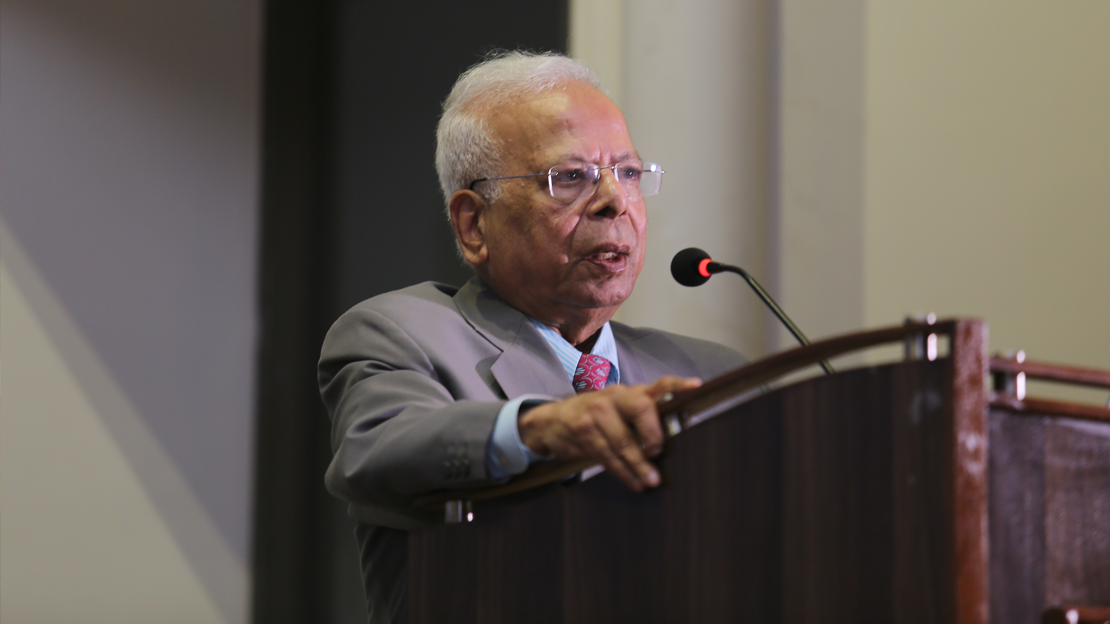
In the concluding session, Dr. Maria Isabel Maldonado Garcia from the Punjab University, spoke about the significance of organizing thoughts and putting them down into words. She summarized the two plenary sessions, and congratulated Ms. Maria Hassan and Mr. Javed Jabbar for their wonderful work. Mr. Jabbar then presented a memento to Dr. Maria Isabel.
The last speaker was Dr. Noman Ul Haq, Professor Social Sciences & Liberal Arts who gave the vote of thanks. Lamenting the loss of languages in Pakistan, he said, 'Our archives are collecting dust.' He thanked Ms. Maria, Dr. Ishrat and Mr. Jabbar. The First National Dialogue on Writing Centers was quite pertinent in the context of Pakistan's ESL (English as Second Language) status. It drew on global practices and was yet sensitive to local needs.
Book Club Sessions
Pride and Prejudice by Jane Austen
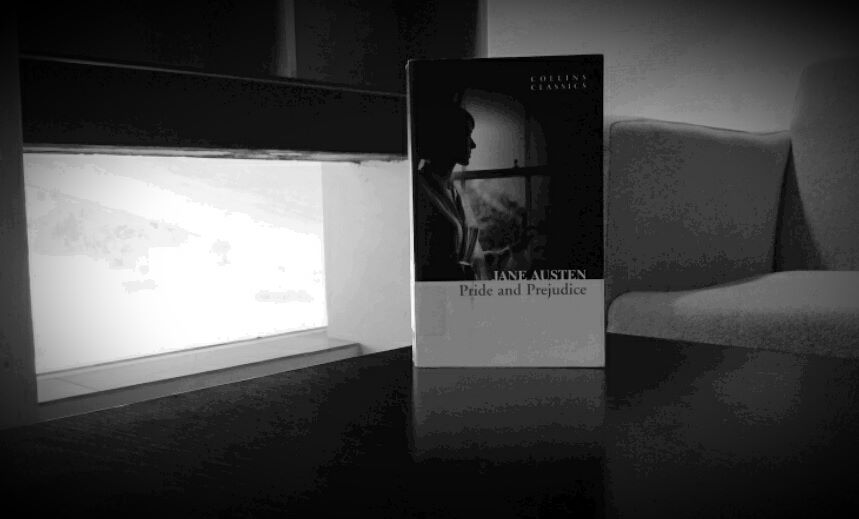
The first book club that we had was on Jane Austen’s Pride and Prejudice. Nadya Chishty Mujahid, the moderator, was quite flamboyant as she is a prolific writer who has authored several scholarly books, in collaboration with the Edwin Mellen Press, on various topics from poetry and music, to art and literature, in which she specializes. With Jane Austen being one of her most researched, and beloved author, Nadya said, “In all her books, Austen makes only two mistakes; one when she has the strawberries planted out of season, and second when Elizabeth is impudent to her aunt, and yet Darcy still goes ahead and marries her.” But that’s the legitimacy derived as the author. The Narrative Will, if you will please. The author has absolute power. The session went fairly well, which is to say, anything untoward did not chance. The students came, the tea and biscuits were served, the characters and biscuits were shared, and consumed, all around. The session went fairly well, indeed.
The Reluctant Fundamentalist by Mohsin Hamid
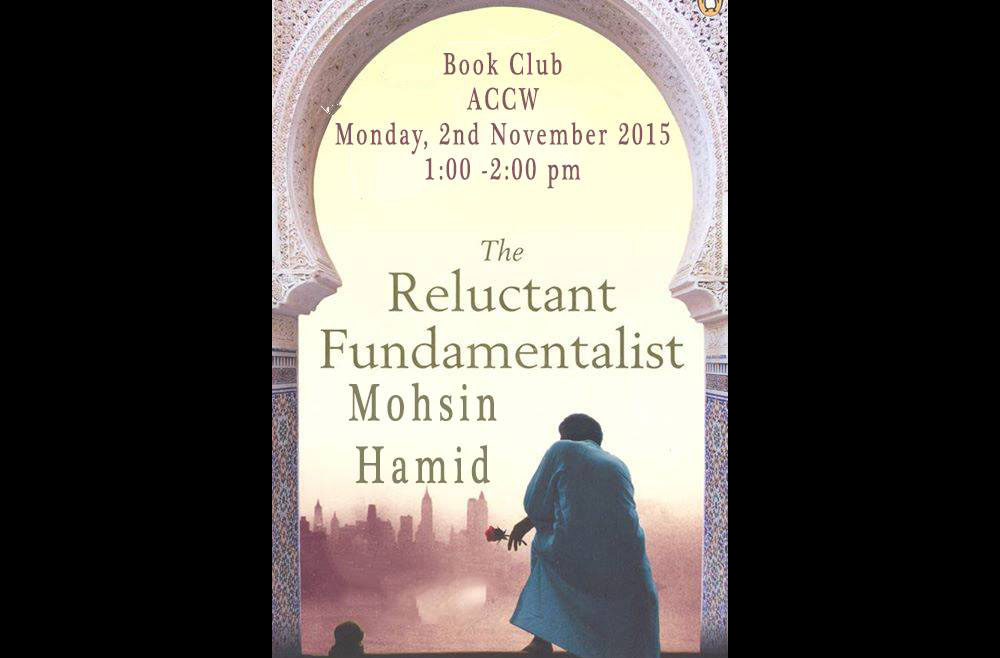
Meeting date: 2nd Novstrongber.
Starting time: 1:00 pm.
Moderator: Naveen Zehra Minai.
Total attendance (Open Session): Approximately 20-25.
The discussion regarding the book was started by professor Minai, “Okay, start talking. What was so good and bad about the book? What did you like and dislike? Also, make sure to tell why.”
Our discussion revolved around five points mostly. One, the idea of the unreliable narrator and what purpose it serves. Two, plot development in contrast with character development within the book. Three, “The smile” that the protagonist has as the World Trade Centre fell and its unnerving implications. Four, how well does the film fare in contrast to the book. Fifth, the cliff hanger; who is the bomber?
Study Circle Sessions
A Case Study on Pakistani Fiction
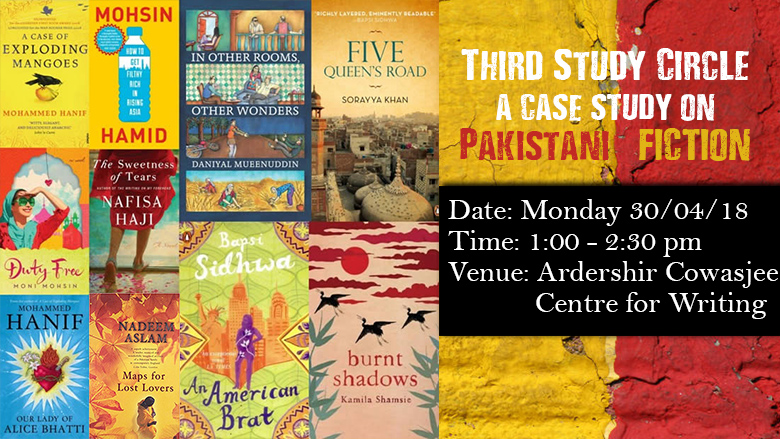
Poems on Partition

In continuation with literature as our theme ACCW, in its Second Study Circle, discussed the poetry written/sung during the 1947/71 partition in order to inch closer to a nuanced understanding of what is literature. The need for this is imperative because as Eagleton argues literature,
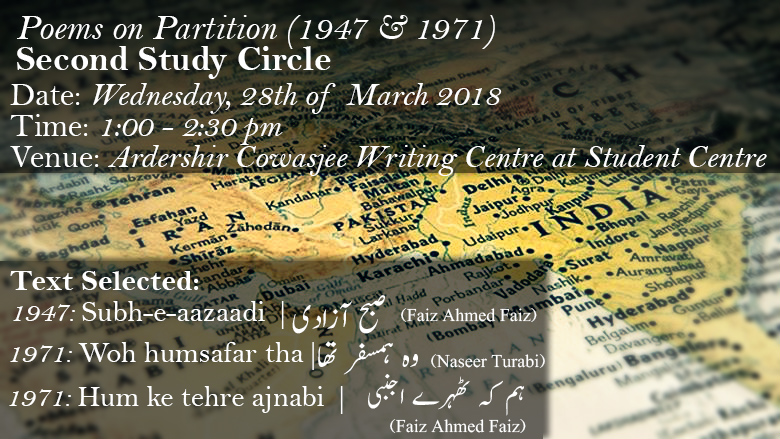
What is Literature?
On 15th Feb 2018, the Ardeshir Cowasjee Center for Writing (ACCW) held its first Study Circle session on "What is Literature?" written by Terry Eagleton. The session was led by Muhammad Khurram, a senior consultant at ACCW.

In the past ACCW has arranged Book Club sessions, however, we felt that these sessions were restricted by their subject matter. The discussions of these sessions would revolve around a certain book. As such, we felt that the scope of our discussion was too narrow. Our vision too myopic. We were not creating a space that would allow the imagining of bodies and other ways of being. Our conversations were only for a privileged few who benefited from either their class, ethnicity, gender and/or an intersection of these and other variables. That is, these spaces of conversations were not accessible.
Moreover, simply having the time to read a book is an immense privilege. Someone of us does not have that. As such, these Book Club session would not be a place of learning, knowledge production, and dissemination. Therefore, we decided to revamp our discussion sessions into Study Circle sessions in order to be more accessible.
Additionally, we felt that it might be more fruitful to take a step back and ask ourselves the reasons for having these discussions in the first place. That is, why read literature, what is its significance, and what is "Literature" (with the capital L) after all? Before attempting to discuss "literature". We felt that it would be most instructive if we started first with the question of what is literature and how do we come to an understanding of it?
The session, as previously mentioned, was an open discussion. Reading the article in question to take part in the discussion was not needed. Some of those who came did read the article--which is quite short and funny--allowed for them to share their understanding of it. However, and we stress this, for those who had not read this article in question, their contribution definitely enriched our discussion. After all, what type of (critical) thinking is it if not does account for the lived experiences of our lives and others?
During the session there was a comfortable back and forth between each person as we tried to grapple with what is literature and why should we care. The age-old notion of objectivity, subjectivity, hard sciences vs. the soft sciences (are they even “science”?), epistemology, that is the theory of knowledge, the struggle between form and content, is the medium really the message? And, various other topics were touched upon.
In order to ground our discussion, since abstraction serves no purpose except to make obtuse, the examples of Friends (1994-2004) a TV show was brought up (TV shows have scripts, which are arguably literature). Does Twitter operate as a new form of serialization that produces literature? Did the canonization, and preservation, of Plato’s and Aristotle’s work come about because they are white men? Why do we continue to teach their work? Where are the women of colour? And, why do people insist that Shakespeare’s work has a profound understanding of “human nature” when he was, by all accounts, a cis-gendered, white, heterosexual person belonging to the lower class, and living in British during the 1500s?
In short, it was quite a delightful session. We look forward to having more of these Study Circle sessions throughout the semester under the theme of literature.
Steel Wheels by Asad Rafi
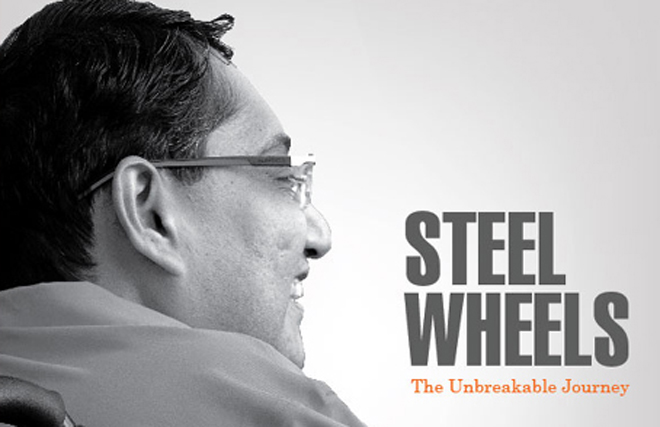
On Friday,11th September 2015, the Ardeshir Cowasjee Center for Writing (ACCW) invited Asad Rafi, the author of the book steel wheels. The aim of the session was to discuss the process through which Asad went through in writing his autobiography. While there are many talks, and writings, on the taxing process that writers go through for their work, I would argue this one stands out because Asad suffers from Friedreich’s Ataxia, a genetic disease that causes progressive damage to the nervous system, despite which he was not only able to write this book but also publish it through a small publishing house located in DHA, Say Publications. Moreover, the identity of the author here is inseparable from the work not only because it is an autobiography but because the work is about his life.
One of the most important matters that came out of this session was that writing requires a lot more room of one's own. That is why one must never forget the material conditions which allows a person, in this case, Asad, differently-abled as he is, to compose such a work and get it published along with media coverage. Otherwise, a close reading of the text is not at all possible, and when we fail at reading a text at thus we fail at understanding the forces/power that is at work in the production of these texts.
Needless to say, Asad Rafi stands as an inspiration for all those aspiring artists and writers who are struggling and trying to their own path.
Writing Fearlessly by Uzma Aslam Khan
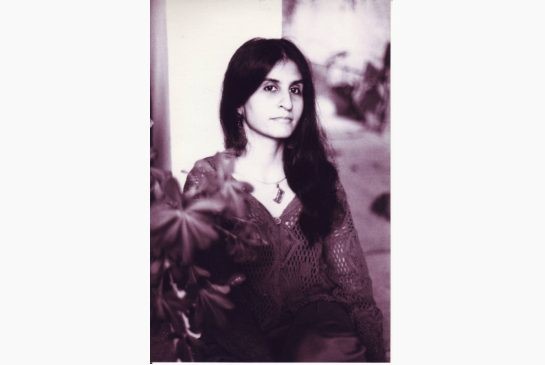
November 2, 2014
As part of the series “When Writers Speak…” the Ardeshir Cowasjee Centre for Writing, IBA Karachi, presented another opportunity for the students and faculty to interact with a celebrated author. Uzma Aslam Khan discussed aspects of her writing and read excerpts from her works.
Mr. Javed Jabbar, Chair of the Centre, also spoke at the session. Ms. Khan is a renowned writer with the incredible capacity of letting her readers become a part of the lands of her imagination that are shaped by the heterosexual matrix. Her book Thinner than Skin claimed the French Embassy Prize for “Best Fiction” at the Karachi Literature Festival 2014. At the session, Ms. Khan not only discussed aspects of her writing, but also read select pieces from her works. Most notably she read excerpts from Thinner than Skin and Trespassing. She also talked about her use of what she calls “the holy trilogy” that helps her shape her work, namely surprises, research and immersion.
According to her, “Wonder and research go hand in hand and you just stumble upon [a story]”. She talked about how her experiences have inspired her novels, as in the Geometry of God, voted the Best Book of 2009 by Kirkus Review, she used her personal experience of living near a site where fossils were discovered as the setting to shape the story. In addition, her sense of curiosity drives her extensive research as a writer, and, according to Ms. Khan, the third most important element of writing is emotional involvement, which she calls ‘immersion’.
The readings were followed by a question-and-answer session. Upon being asked about the importance of staying in or leaving one’s comfort zone as a writer, she said, “It can be really fulfilling to find one’s comfort zone,” while adding, “But it can be dangerous to stay in that shell.” Ms. Khan said, “I don’t want to write the same book again. If two characters are similar, I have failed”. When asked about her favorite authors, she named Patrick Chamoiseau, George Orwell and Virgina Woolf as few of the writers she admired. Concluding the session, she emphasized the importance of extensive reading and the need for writing fearlessly.
Literature: The antidote to the Pakistani identity crisis
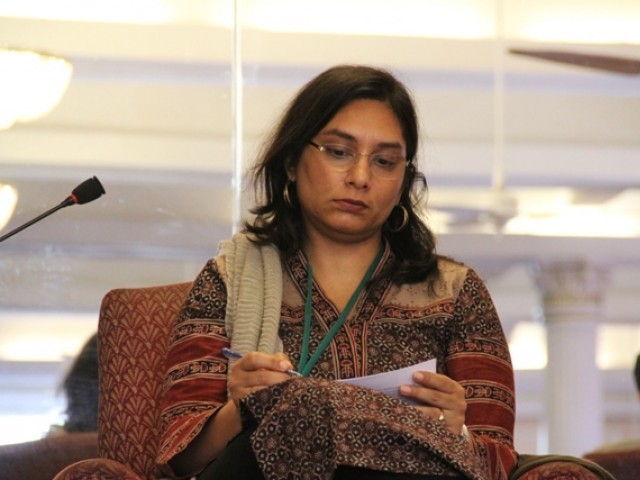
March 15, 2014
Bina Shah is a Pakistani author with who has written the “Slum Child” and “The 786 Cyber Café”. In her talk titled "Literature: The antidote to the Pakistani identity crisis", she shared her ideas on the effect of Pakistani writers writing in English on the contemporary and postcolonial environment. She talked about the formulation of the ‘Pakistani identity’ and the ‘identity crisis’ that stems for a modern Pakistani living in a nation of “a myriad of ethnicities, histories, languages, religions, experiences”, saying that she truly believes that literature can be a “powerful tool to heal Pakistan’s identity crisis.”
She also spoke about the plight of the minority population of the nation, plurality eludes some of us, saying that Pakistani writers, by writing about them have given them “space in their narratives, and hence the psychological and mental space which can translate to physical space that they need to be productive and safe in society.” However, as various feminist such as bell hooks and Spivak have pointed out that it would certainly be better instead of speaking for these minorities we allowed them to speak on their own.
She went on to talk about the various linguistic tools that modern Pakistani writers use, such as transliterating dialogue, rather than translating local expressions. According to Shah, this is a powerful tool, which she termed “reverse colonization”, to own local identities and tell the countless stories present in this postcolonial time. She mentioned a number of writers who use this technique to portray the local cultural nuances.
Her final words of advice encouraged young people to write, as “stories have the power to make voices heard, overcome passivity, broaden our horizons and gradually help overcome the Pakistani identity crises, if allowed to flourish.”
Training and development program for non-managerial staff
Training and Development Program was the first program specially designed for non-managerial staff of IBA, where the mentors appointed for the writing center improved the participants’ English writing and speaking skills. Additionally, basic computer literacy was also taught for their work purposes. In the eight-week program, the tutors worked on the vocabulary, grammar and sentence structure aspects of writing. Three examinations were also conducted to keep a track of participants’ progress and to identify their strengths and weaknesses. This program proved to be very useful for all the staff members who were a part of it. They gave positive feedback regarding the program and requested the Writing Centre to arrange more programs of a similar nature for them in the future.
Dissertation Bootcamp
The Dissertation boot camp was yet another successful endeavor launched by the Ardeshir Cowasjee Centre for Writing to uphold its legacy of providing advantageous opportunities to writers writing in the academic domain. The boot camp focused on helping Ph.D-level students improve their theses, and aid them to incorporate such elements that could help their dissertations stand out from the rest. Over the course of the boot-camp, the mentors and supervisors helped the participants refine their proposals and research papers. Moreover, the participants were also given guidance on their grammar, vocabulary and sentence structures, and were aided to formulate their introductions, abstracts, conclusions and writing strategies. The immense support of the mentors ensured regular participation of the participants. The enthusiasm was evident in both participants and mentors, and the boot camp was reviewed positively by both groups.